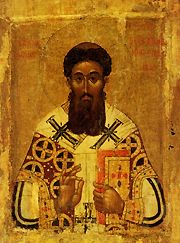|
|||
|---|---|---|---|
| This weekly bulletin insert complements the curriculum published by the Department of Christian Education of the Orthodox Church in America. This and many other Christian Education resources are available at http://dce.oca.org. | |||

It could be a question for an Orthodox version of Jeopardy: What two well-known saints were captured by pirates? The answer would be Saint Gregory Palamas and Saint Patrick of Ireland. Though their experiences with pirates came at different times in their lives, both must have experienced terror. And both lost their liberty, at least for a time, after their capture. Patrick, born in southwest England, was taken by Irish pirates at the age of sixteen and was sold into slavery in Ireland, toiling for years there in isolated misery. He managed to escape and to convince some sailors to take him back to England, where he was reunited with his family. We might assume that Patrick would want nothing more to do with Ireland or the Irish after years of such humiliating hardship. Yet in the year 435, already ordained, he agreed to go back to Ireland and preach the faith. He did it so well and so lovingly that besides becoming Ireland's most revered saint, he was given the title "Equal to the Apostles" because he brought a whole country to Christianity. Nine hundred years later, Gregory Palamas was writing about monasticism and the Christian life. As Father John Meyendorff has written, Gregory believed that: "...the difference between the apostles who went up Mount Tabor with Jesus and the Christians of today lies in the fact that Peter, James and John saw the light "exteriorly," as an object appearing supernaturally to their bodily eyes, while Christians now, sacramentally united to the Redeemer after His death and resurrection, can contemplate the light interiorly, within their hearts. They can develop the potentialities of this gift and its divine character ever more and more until they find God Himself." (From Fr. Meyendorff's book "St. Gregory Palamas and Orthodox Spirituality") While sailing from Thessalonica to Byzantium, Gregory had his own experience of being captured by pirates. They were Muslim Turks, and they kept Gregory and his fellow passengers in captivity for almost a year. Far from keeping aloof from his "hosts", he spent the time in amicable theological disputes with the son of the Emir, and expressed the hope that "a day will soon come when we will be able to understand each other" (Meyendorff, 106.) This great saint, as we can see from the quotation above, clearly believed in the uniquely authentic relationship of Christians with God through Jesus Christ. Yet his mind and heart were open to exploring another faith.
If Patrick had refused to return to the place where pirates sold him into slavery, Christianity might not have come to Ireland. If Gregory had refused conversation with his Turkish captors, we would not have him as a model for our efforts to engage with Islam today. Great saints, it seems, can use anything, including capture by pirates, to the glory of God. |
|||

